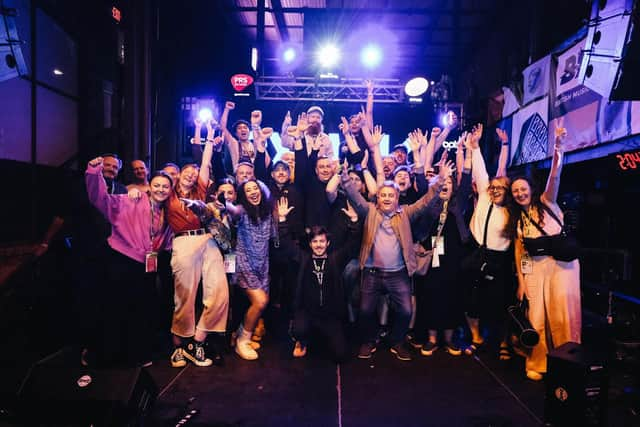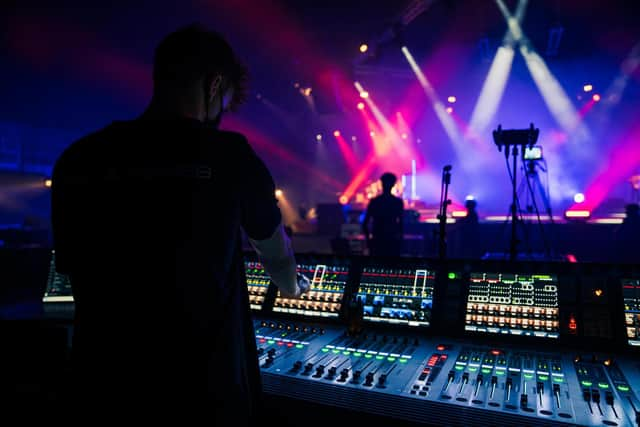The corner of Yorkshire creating shows and sets for the biggest festivals and artists in the world
“I’ve got Sting in here today,” Ant Forbes says casually. “I’m just watching him arrive as we speak.”
We’re chatting via video call, him at the London studio of the West Yorkshire based live events community Production Park, me in the spare bedroom-cum-office at my home in Barnsley. I know where I’d rather be.
Advertisement
Hide AdAdvertisement
Hide AdOn Forbes’ office walls are setlists from a number of artists who have used the studio and its rehearsal and production facilities. It’s an impressive list.


“We’ve had Metallica, Eric Clapton, Genesis and Phil Collins here right through to smaller, breaking bands,” Forbes explains.
“We had Royal Blood in here when they first started out, we had George Ezra in a couple of days ago and he’s been coming here since he first started, Rag ‘n’ Bone Man, he’s another one. The list is long.”
The Mill, based in Wimbledon, is the London studio of Production Park, a campus for entertainment technology nestled in the former mining town of South Kirkby, on the outskirts of Wakefield.
Advertisement
Hide AdAdvertisement
Hide Ad

Founded in 2015 with the intention of being ‘Where Live Industry Lives’, it is home to a community of live events businesses, six studios and a creative cohort of more than 200 students based at onsite education facility Backstage Academy.
The next generation of live industry professionals are in the thick of it.
Studying courses in live events production, stage management and visual design and production, they’re at the heart of a park where multi-million pound concert touring stage sets are constructed, a place where theatre props, set designs, sports structures and sculptures are created and where the shows of some of the biggest acts in the world are brought to life, with lighting, sound and production rehearsals.
“The more work you can do in rehearsal, the more lights you can pre-program and trusses you can pre-rig, the quicker the shows are going to be to put in and out of arena,” says Sam Wilkinson, the sales and development manager at Production Park.
Advertisement
Hide AdAdvertisement
Hide Ad“And that means more people can see more shows and you can do more demanding tour routes and shows back to back.
“With the next generation of students coming through Backstage, they’re learning on the job and seeing things unfold before their eyes. It means the next generation of crew is ready to go and trained to get shows looking their best and in and out of venues.”
Students get to work on major productions and at festivals such as Glastonbury. In March, a team from Production Park powered the British Music Embassy (BME) line-up at South By South West (SXSW) Festival in Texas.
Live events production student Bradley Nicholson was part of the team, which, in collaboration with BBC Music Introducing Live and the Department for International Trade was responsible for delivering all aspects of the BME’s presence, including 70 scheduled performances designed to give burgeoning British artists a platform onto which to showcase themselves internationally.
Advertisement
Hide AdAdvertisement
Hide Ad“It was my job to make sure that the show lights were on, the artists looked good and the audience were having a really good time,” says Nicholson. “It was awesome and the busiest experience I’ve had so far. It was great to have that real world chuck in and go experience.”
The festival experience is already proving to be a springboard for third year Nicholson, who has a few months left of his course before he plans to go freelance, doing technical installs and design work.
Phonecalls about work are coming in and when we spoke, he was due to fly to Italy for an installation job.
“[The BME stage] is definitely going to be one for aspiring crew as well as aspiring artists moving forward,” Forbes tells me.
Advertisement
Hide AdAdvertisement
Hide Ad“The reason Production Park get involved in SXSW is because we can clearly see that whilst we have the world’s biggest artists come to our studios right now, the world’s biggest artists for tomorrow are literally these people…
“It’s us trying to play our part to help the grassroots of our industry because if we don’t we’re putting a sell by date on it and ourselves.
“And if we’re playing our part in providing an international platform for aspiring artists, then by the same token, we should do so for technical artists and the people who create the stage.”
Back in Yorkshire, in recent times, the likes of Depeche Mode, The XX, Coldplay, System of a Down and Little Mix have walked through Production Park’s doors to make use of arena-sized on-site rehearsal facilities, whilst its companies have provided stage and set solutions for concert touring artists such as Muse, Beyonce and Jay-Z, Coldplay, Take That and Robbie Williams.
Advertisement
Hide AdAdvertisement
Hide AdIt has drawn some of the biggest names in the world to the region - and with all those visiting the site for production, there is inevitably a boost for the local economy.
Wilkinson gives an example: “We’ve had Cirque du Soleil on site with 100-150 people across three months. That’s all money coming into Wakefield or Doncaster or wherever they’re staying. They’re spending in local shops, going to local bars and restaurants.”
Production Park is continuing to develop, with plans for an innovations centre focused on developing technologies for the entertainment and events production industries, a new university building and further units for more live events businesses to join the community. The former, Xplor, will cover specialisms such as music, TV, film, sports, corporate events, theatre and arts.
Forbes tells me the impact of the Covid-19 pandemic, which ground the live industry to a halt, has actually helped to shape the direction of Production Park going forward.
Advertisement
Hide AdAdvertisement
Hide Ad“Our livelihood fell off a cliff overnight. We lost two million quid in a heartbeat in terms of confirmed bookings we had across the studios. It was testing for sure,” he says.
“We worked out ways of redeploying the studios to the film and TV world. They’ve always been a music resource but people continued making film and TV through the lockdowns so we redeployed our skills to try to accommodate them which was really interesting.”
“It’s kind of changed Production Park’s direction slightly,” he adds. “Rather than just ploughing through the live events music world, we’ve split our attention now and we’ve tried to turn the studios to be much more film and TV friendly as well as music.
“With music, we’re up there with the best in the world no question. There’s a lot of film and TV studios out there and we’re now trying to compete with them up. And I think we’re doing a good job with it.”
